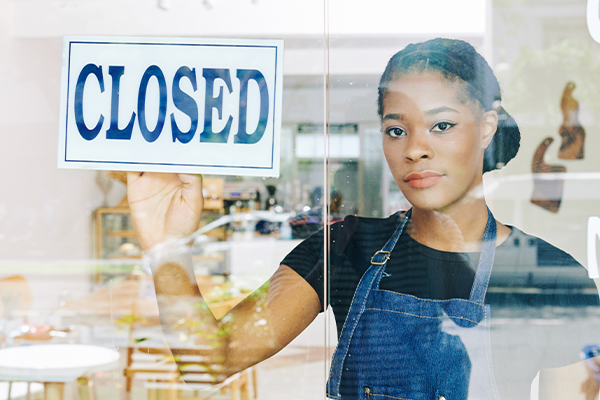Fact Sheet

COVID-19 Could Change the Way Pennsylvania Does Business
Elvira Aslanova, owner of Beehive Hair Salon, was the epitome of the American success story. Fleeing the Soviet Union with $400 in her pocket, she planted roots in Philadelphia and operated a neighborhood salon there for almost eleven years. Then, the state lockdown put a $50,000 dent in her income—and Elvira had to shut down Beehive Hair Salon for good.
Elvira is not the only small business owner who took a hit from COVID-19 restrictions.
In April, over 60% of Pennsylvania’s small businesses reported that they would close permanently within five months if crisis restrictions continued. Four months later, this prediction came true for many: businesses such as Jessa Stevens’ kombucha brewery, Andy Lee’s Taps Tavern, and Doug George’s 110-year old family flower shop are permanently shuttered.
Entrepreneurs who put their heart and soul into a small business were forced to watch it go up in smoke. It’s more than a statistic—it’s a crushing blow.
In Pennsylvania alone, 91% of restaurants have laid off or furloughed an average of 84% of total staff. That’s 332,000 jobs gone. More recently, the PA Restaurant and Lodging Association reported 63% of establishments will not survive another 6 months under the current restrictions.
Workers and employers aren’t the only people impacted when a business closes. Pennsylvania municipalities that rely on income-tax also face cash insolvency as local residents lose work. One study projected a 40% decline in local government revenue due to COVID-19. On the state government level, Pennsylvania ended the fiscal year in June with a $3.2 billion shortfall.
Small businesses and municipalities are drowning financially, but state taxpayers can’t afford tax hikes. The solution? Reopen Pennsylvania’s economy and jumpstart businesses and municipalities by changing the way we regulate and tax small businesses.
These policy reforms are outlined in our Race to Rebuild Report and include bills to help businesses and municipalities weather COVID-19:
- HB 1603 (Rep. Seth Grove) and SB 202 (Sen. Judy Ward) would adjust the tax code to permit small business owners to deduct net operating losses in future tax years.
- Rep. Gary Day’s HB 2789 would allow restaurants to forego paying sales tax to the state until they can operate at 100% capacity.
- SB 1181 (Sen. Michele Brooks) and HB 2384 (Rep. Dawn Keefer) would provide liability protection for businesses making good faith efforts to operate safely during a declared disaster emergency.
- Sen. Patrick Stefano has introduced a package of bills that will offer relief to the restaurant and bar industry. The package would remove the food requirement for on-site alcohol consumption, lift the ban on bar service, expand outdoor dining to non-contiguous areas, and waive license renewal and permit fees for one year.
- SB 1303, (Sen. Kristin Phillips-Hill) would give schools, counties, and local governments the option to waive prevailing wage requirements. Prevailing wage mandates artificially raise the costs of government projects 10 to 30% percent above the private sector average. With higher costs, the government gets less done and hires fewer workers.
- SB 251 (Sen. Kristin Phillips-Hill) would create an Independent Office of the Repealer to systematically review existing regulation and recommend their repeal, modification, or revision. The bill also requires that for every new regulation created, two must be repealed.
- SB 5 (Sen. John DiSanto) would require the General Assembly to approve any economically significant regulation, defined as having an impact of $1 million or more per year for the state, municipalities, or private sector.
Entrepreneurs like Elvira, Jessa, and Andy deserve a fighting chance to keep their business dreams alive. Let’s take the cries for help from Pennsylvania small businesses and local governments seriously and lift their regulatory burden. That’s the only way to heal Pennsylvania’s wounded economy.